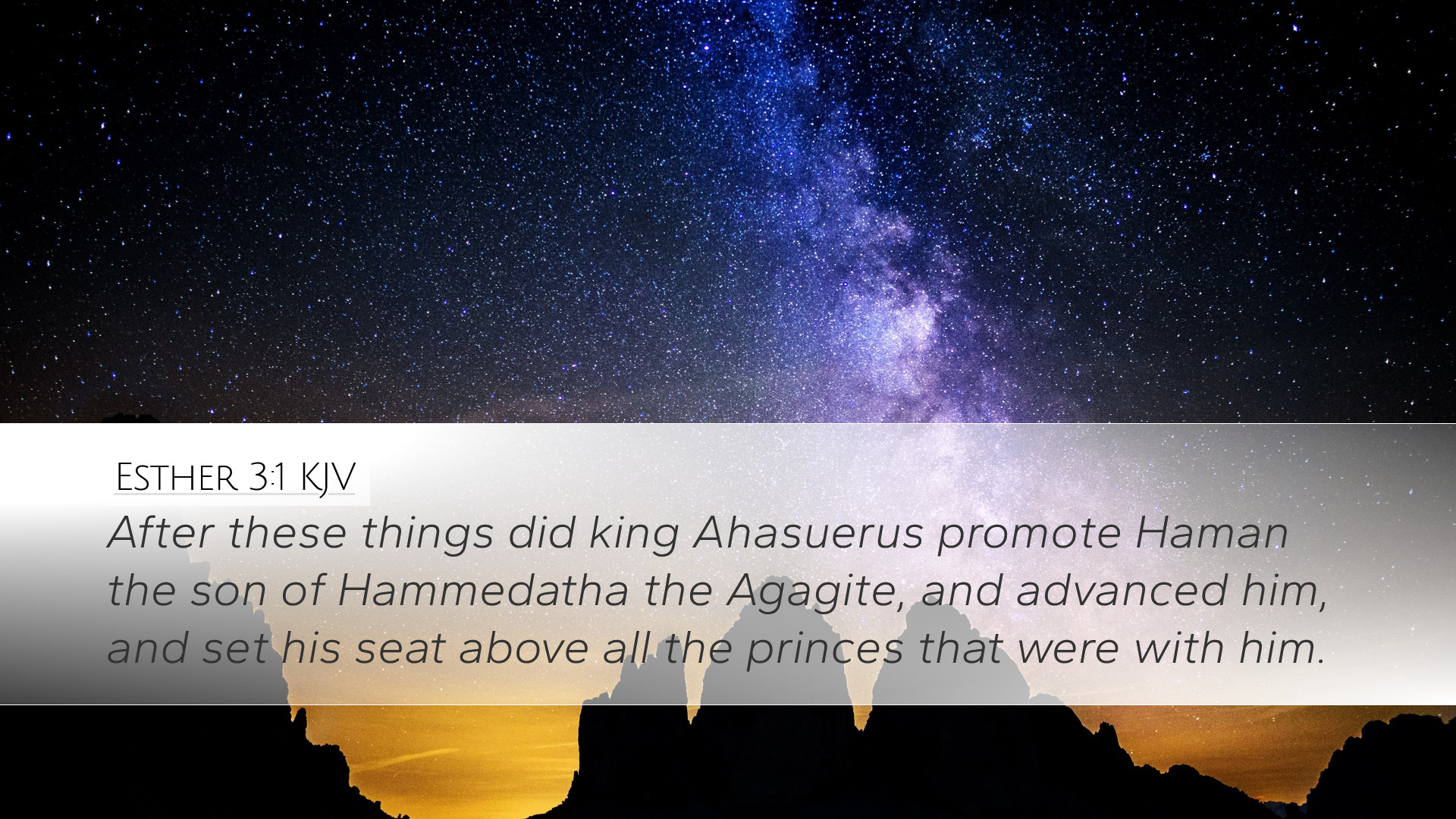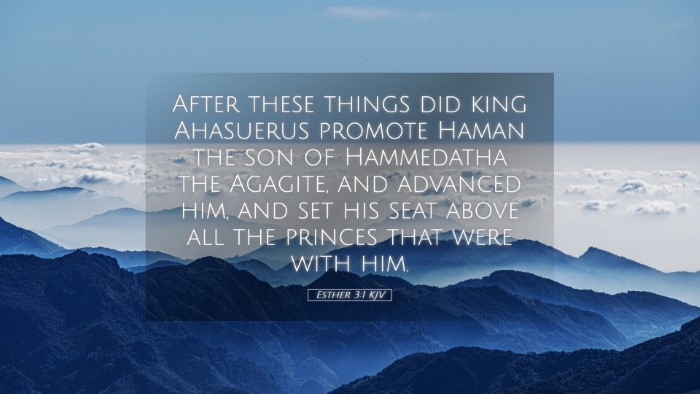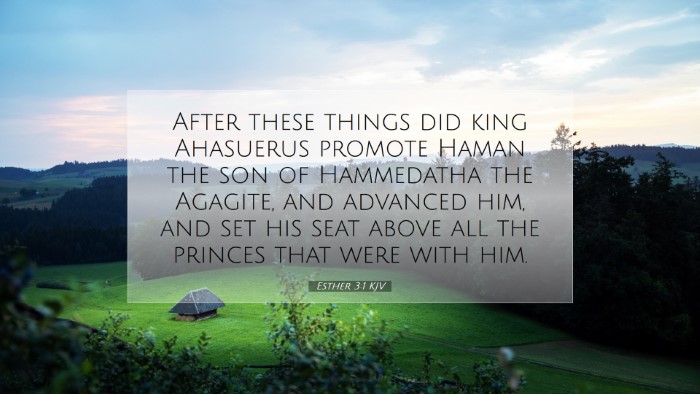Old Testament
Genesis Exodus Leviticus Numbers Deuteronomy Joshua Judges Ruth 1 Samuel 2 Samuel 1 Kings 2 Kings 1 Chronicles 2 Chronicles Ezra Nehemiah Esther Job Psalms Proverbs Ecclesiastes Song of Solomon Isaiah Jeremiah Lamentations Ezekiel Daniel Hosea Joel Amos Obadiah Jonah Micah Nahum Habakkuk Zephaniah Haggai Zechariah MalachiEsther 3:1
Esther 3:1 KJV
After these things did king Ahasuerus promote Haman the son of Hammedatha the Agagite, and advanced him, and set his seat above all the princes that were with him.
Esther 3:1 Bible Commentary
Commentary on Esther 3:1
Bible Verse: "After these things did King Ahasuerus promote Haman the son of Hammedatha the Agagite, and advanced him, and set his seat above all the princes that were with him." (Esther 3:1)
Introduction
In this pivotal verse in the book of Esther, we witness the elevation of Haman, a character whose actions would later instigate a major conflict within the narrative. This commentary aims to distill insights from prominent public domain scholars, allowing for a nuanced exploration of the themes and implications of Esther 3:1.
The Historical Context
According to Matthew Henry, this moment in the book of Esther follows a series of significant events in the Persian court. The king, Ahasuerus, uses this occasion to reinforce his own authority by promoting Haman. Henry argues that Haman’s elevation demonstrates how a king’s favor can significantly shift the political landscape and influences the lives of his subjects, particularly the Jewish people.
Albert Barnes elaborates on the significance of Haman's lineage, noting that he is described as "the Agagite," a term imbued with historical enmity toward the Israelites. This lineage connects Haman to the Amalekites, a nation that had been historically opposed to Israel, thus imbuing his rise with layers of tension and foreboding.
The Character of Haman
Identification and Ambition: Haman's character serves as a study of ambition and malice. As Adam Clarke notes, Haman’s rise to power was not merely based on merit but on a combination of calculated guile and the ability to ingratiate himself with the king. This raises poignant questions regarding leadership and the moral integrity of those in authority.
Manifestations of Pride: According to Henry, Haman's pride led to a sense of superiority over others. His ambitious nature is reflected in his immediate push for respect and adoration from the king’s subjects, setting the stage for his later conflicts with Mordecai.
Theological Implications
Divine Sovereignty: The promotion of Haman is seen by many scholars as a demonstration of God’s sovereign plan at work, even when evil seems to triumph. Barnes highlights a theological perspective on the interplay of human action and divine providence, suggesting that God can use even the wicked deeds of men to achieve His ultimate purposes.
Contrast with Mordecai: Haman’s rise stands in stark contrast to Mordecai’s position. Whereas Haman is elevated above all princes, Mordecai represents those who remain lowly, often disrespected. This juxtaposition invites reflection on the values of human greatness versus divine favor. Henry emphasizes that true honor comes from God rather than from the accolades of men, a theme central to the entire text.
The Impact on the Jewish Community
The elevation of Haman sets into motion a series of events that affect the Jewish people profoundly. As noted by Clarke, it represents a shift in the environment, forecasting impending peril for the Jews residing in Persia. Haman’s animosity would become a catalyst for persecution, forcing the community to confront significant challenges to their identity and faith.
Literary Elements
Foreshadowing: This verse serves as a foreshadowing of the events to come, establishing a tone of suspense and uncertainty. The reader is led to consider the implications of Haman’s rise on both a personal and national level for the Jewish people. As Barnes articulates, the narrative builds tension, inviting the audience into a broader reflection on justice and the consequences of evil.
ConclusionEsther 3:1 is not just a historical account; it encapsulates themes of power, pride, and the providential hand of God in the affairs of man. By examining the insights of Henry, Barnes, and Clarke, we gain a multidimensional understanding of this important moment in the Esther narrative. Those in ministry, study, or scholarship are encouraged to reflect on how these themes resonate today—reminding us of the complexities of the human condition and the enduring sovereignty of God.
Reflection Questions
- What does Haman’s elevation teach us about the nature of power and favoritism in positions of authority?
- In what ways does this narrative prompt reflection on divine sovereignty in our contemporary context?
- How can we apply the lesson of Mordecai’s responses to Haman in our own lives when facing opposition?


